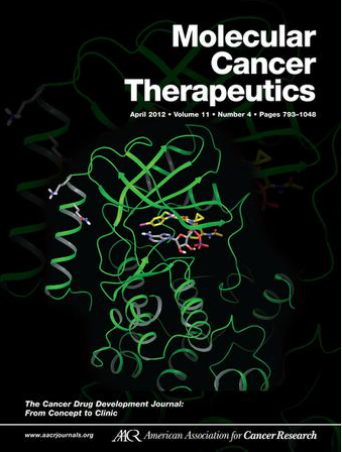Abstract A015: Exploiting endogenous replication stress with a novel targeted therapy in Ewing sarcoma
IF 5.3
2区 医学
Q1 ONCOLOGY
引用次数: 0
Abstract
Ewing sarcoma (EwS) is a rare and aggressive disease that typically affects the bone of children and young adults. Although there are moderate 5-year survival rates for primary disease, there is a high rate of recurrence and a lack of targeted therapies in this setting. Furthermore, pediatric exposure to chemotherapies leads to an increased risk of long-term complications, including secondary cancers, cardiomyopathy, and infertility. Therefore, there is a desperate need for targeted therapies which improve therapeutic outcomes and reduce exposure to chemotherapy in these patients. Like many pediatric cancers, EwS has a low mutational burden. Instead, it is driven by chromosomal translocation between a FET family member, EWSR1, and an ETS family member, usually FLI1. The EWSR1-FLI1 fusion protein acts as an aberrant and oncogenic transcription factor, disrupting cell cycle control, cell migration, and proliferation. ETS family members in these fusions retain their ability to bind to the SWI/SNF chromatin remodeling complex, further dysregulating DNA methylation and gene expression. Although targeting of the EWSR1 fusion has not yet been successful, these elevated levels of replication stress (RS) present a unique element of vulnerability within the cell. To this end, our lab has previously identified replication stress response (RSR) inhibitors, DDKi and WEE1i, which can be utilized to exploit the characteristic ability of EwS to maintain high levels of replication stress (RS) and push EwS cells into mitotic catastrophe in vitro. Here, we evaluate the efficacy of the replication stress response inhibitors (RSRi) TAK931 (DDKi) and MK1775 (WEE1i) with chemotherapy regimens commonly utilized in the relapsed/refractory setting in vivo. Using cell line derived xenografts in NSG mice, we show that DDKi and WEE1i with irinotecan limits tumor growth significantly more than existing therapy (temozolomide + irinotecan). Dosing schedules are optimized through dosing de-escalation and alternative-day dosing strategies. We further demonstrate the ability of our RSRi combination to effectively limit tumor growth over time in vivo even when irinotecan dosage is decreased. We go on to investigate the RSRi combination in the presence of ultra-low dose irinotecan. Finally, we utilize reduced representation bisulfite sequencing to examine the epigenetic effects of these treatment regimens. Overall, the exploitation of high endogenous replication stress in EwS by targeted RSRi presents a promising potential therapeutic option for this pediatric patient population. Citation Format: Emily Isenhart, Ajay Gupta, Bryan Gillard, Kristopher Attwood, Joyce Ohm. Exploiting endogenous replication stress with a novel targeted therapy in Ewing sarcoma [abstract]. In: Proceedings of the AACR Special Conference in Cancer Research: Expanding and Translating Cancer Synthetic Vulnerabilities; 2024 Jun 10-13; Montreal, Quebec, Canada. Philadelphia (PA): AACR; Mol Cancer Ther 2024;23(6 Suppl):Abstract nr A015.摘要 A015:利用内源性复制应激的新型靶向疗法治疗尤文肉瘤
尤文肉瘤(EwS)是一种罕见的侵袭性疾病,通常会影响儿童和年轻人的骨骼。虽然原发性疾病的 5 年生存率尚可,但复发率很高,而且缺乏针对这种疾病的靶向疗法。此外,儿科患者接受化疗会增加长期并发症的风险,包括继发性癌症、心肌病和不孕症。因此,这些患者亟需能改善治疗效果并减少化疗暴露的靶向疗法。与许多儿童癌症一样,EwS 的突变负荷较低。相反,它是由 FET 家族成员 EWSR1 和 ETS 家族成员(通常为 FLI1)之间的染色体易位引起的。EWSR1-FLI1 融合蛋白是一种异常的致癌转录因子,会破坏细胞周期控制、细胞迁移和增殖。这些融合蛋白中的 ETS 家族成员保留了与 SWI/SNF 染色质重塑复合物结合的能力,进一步导致 DNA 甲基化和基因表达失调。虽然针对 EWSR1 融合体的研究尚未取得成功,但这些复制应激(RS)水平的升高为细胞内的脆弱性提供了一个独特的因素。为此,我们实验室先前已发现了复制应激反应(RSR)抑制剂 DDKi 和 WEE1i,它们可用于利用 EwS 维持高水平复制应激反应(RS)的特征能力,并在体外将 EwS 细胞推向有丝分裂灾难。在这里,我们评估了复制应激反应抑制剂(RSRi)TAK931(DDKi)和MK1775(WEE1i)与复发/难治性体内常用化疗方案的疗效。通过在NSG小鼠中使用细胞系衍生的异种移植物,我们发现DDKi和WEE1i与伊立替康一起使用时,对肿瘤生长的限制明显高于现有疗法(替莫唑胺+伊立替康)。通过剂量递增和择日给药策略优化了给药计划。我们进一步证明,即使伊立替康的用量减少,我们的 RSRi 组合仍能有效限制体内肿瘤的长期生长。我们接着研究了 RSRi 组合在超低剂量伊立替康存在下的作用。最后,我们利用还原表征亚硫酸氢盐测序来研究这些治疗方案的表观遗传效应。总之,通过靶向 RSRi 利用 EwS 中的高内源性复制应激为这一儿科患者群体提供了一种前景广阔的潜在治疗方案。引用格式:艾米丽-伊森哈特、阿杰-古普塔、布莱恩-吉拉德、克里斯托弗-阿特伍德、乔伊斯-欧姆。利用内源性复制应激的新型靶向疗法治疗尤文肉瘤[摘要]。In:AACR 癌症研究特别会议论文集:扩展和转化癌症合成弱点;2024 年 6 月 10-13 日;加拿大魁北克省蒙特利尔。费城(宾夕法尼亚州):AACR; Mol Cancer Ther 2024;23(6 Suppl):Abstract nr A015.
本文章由计算机程序翻译,如有差异,请以英文原文为准。
求助全文
约1分钟内获得全文
求助全文
来源期刊
CiteScore
11.20
自引率
1.80%
发文量
331
审稿时长
3 months
期刊介绍:
Molecular Cancer Therapeutics will focus on basic research that has implications for cancer therapeutics in the following areas: Experimental Cancer Therapeutics, Identification of Molecular Targets, Targets for Chemoprevention, New Models, Cancer Chemistry and Drug Discovery, Molecular and Cellular Pharmacology, Molecular Classification of Tumors, and Bioinformatics and Computational Molecular Biology. The journal provides a publication forum for these emerging disciplines that is focused specifically on cancer research. Papers are stringently reviewed and only those that report results of novel, timely, and significant research and meet high standards of scientific merit will be accepted for publication.

 求助内容:
求助内容: 应助结果提醒方式:
应助结果提醒方式:


